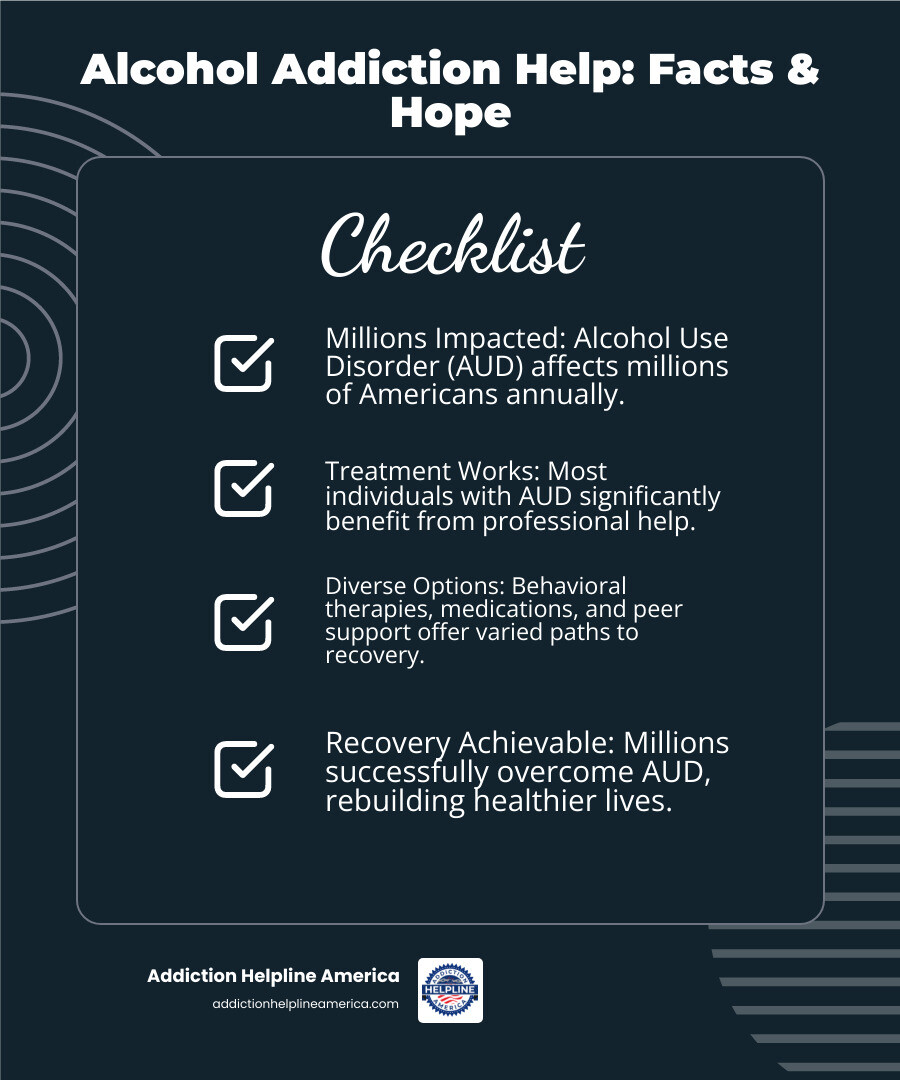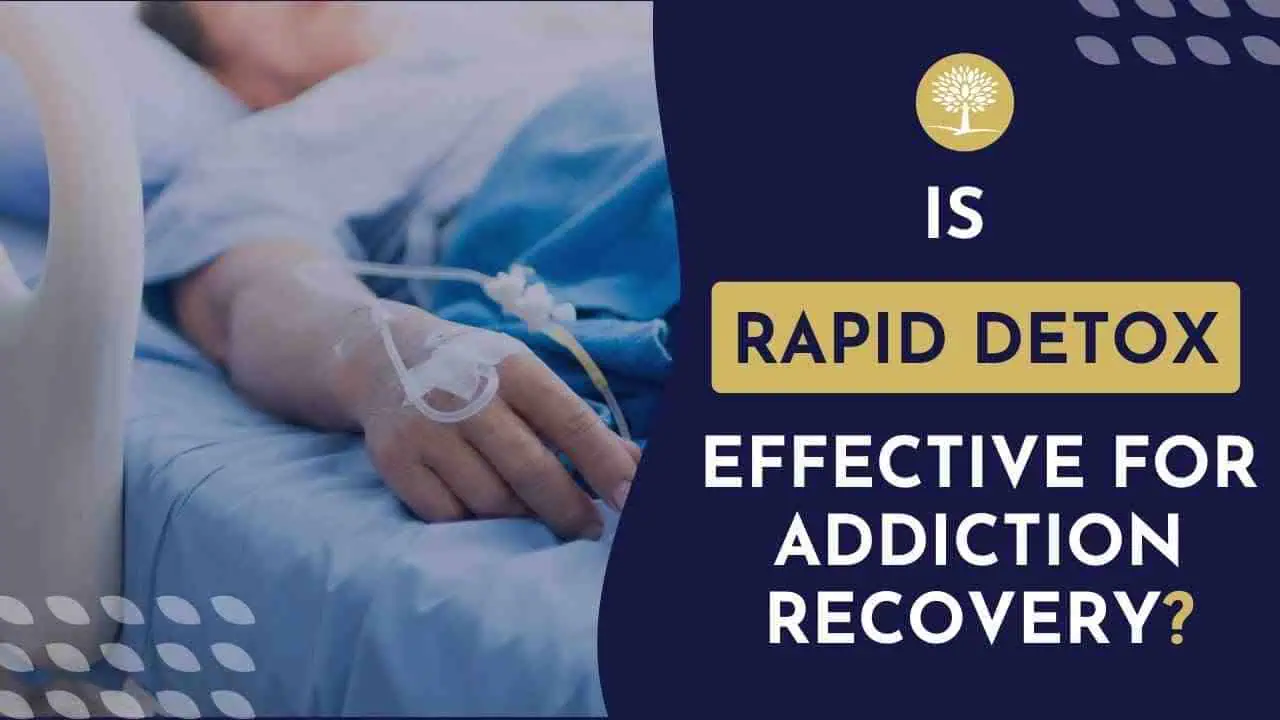
Why Alcohol Addiction Help Is More Accessible Than Ever
Alcohol addiction help is available today in more forms than ever before, giving hope to the millions of Americans struggling with alcohol use disorder (AUD). Whether you’re concerned about your own drinking or worried about a loved one, understanding your options can be the first step toward recovery.
Here’s what you need to know about alcohol addiction help:
- Treatment works: Most people with AUD can benefit from some form of treatment, regardless of how severe the problem may seem
- Multiple options exist: From medications and behavioral therapies to peer support groups and medical detox
- Recovery is possible: Millions of people have successfully overcome alcohol addiction and rebuilt their lives
- Help is confidential: Treatment providers offer private, judgment-free support 24/7
- You don’t have to go alone: Professional healthcare teams, family support, and peer groups can guide your journey
Research shows that genes may be responsible for half of all the risk for alcohol addiction, but this doesn’t mean recovery is impossible. In fact, studies indicate that no matter how severe the problem may seem, most people with AUD can benefit from treatment. Many others substantially reduce their drinking and report fewer alcohol-related problems.
The journey from recognizing a problem to achieving lasting sobriety involves several key stages. It typically begins with acknowledging the need for help, followed by medical detox (if needed), rehabilitation through therapy, and ongoing maintenance support.
At Addiction Helpline America, we’ve dedicated our mission to providing compassionate, confidential alcohol addiction help to individuals and families affected by substance abuse. Our team of addiction specialists, counselors, and recovery advocates connects people with vital treatment resources, support groups, and personalized guidance to help them make informed decisions about their recovery journey.
Recognizing the Need for Help: Signs and Long-Term Risks
Sometimes the hardest person to convince that there’s a drinking problem is yourself. Alcohol addiction help becomes necessary when drinking shifts from something you enjoy to something that controls you. The challenge is that this shift often happens gradually, making it difficult to recognize when casual drinking has become something more serious.
Understanding the warning signs isn’t about judgment—it’s about awareness. Many people struggling with alcohol use disorder (AUD) are high-functioning individuals who maintain jobs, relationships, and responsibilities while battling an internal struggle that others can’t see.
What are the Signs and Symptoms of Alcohol Addiction?
Alcohol Use Disorder isn’t a character flaw or a sign of weakness—it’s a chronic brain disease that actually changes how your brain works. The medical community recognizes AUD as a legitimate health condition that requires professional treatment, just like diabetes or heart disease.
The Diagnostic and Statistical Manual of Mental Disorders (DSM-5) provides clear criteria for identifying AUD. These symptoms fall into four main categories: impaired control over drinking, social impairment, risky use of alcohol, and physical symptoms like tolerance and withdrawal.
You might have AUD if you experience impaired control through drinking more or longer than you planned, making unsuccessful attempts to cut back, spending lots of time drinking or recovering from drinking, or having strong cravings for alcohol.
Social impairment shows up when alcohol interferes with your responsibilities at work, school, or home. You might continue drinking despite relationship problems it causes, or you might give up activities you once enjoyed to drink instead.
Risky use means drinking in dangerous situations—like driving—or continuing to drink even when you know it’s making physical or mental health problems worse.
The physical signs include tolerance (needing more alcohol to feel the same effects) and withdrawal (feeling anxious, shaky, nauseous, or worse when you stop drinking).
If you recognize two or three of these patterns, you might have mild AUD. Four to five symptoms suggest moderate AUD, while six or more indicate severe AUD. The good news? All levels respond well to treatment.
When to Seek Professional Alcohol Addiction Help
The question isn’t whether your drinking is “bad enough” to get help—it’s whether alcohol is making your life harder than it needs to be. Alcohol addiction help is available regardless of how severe your situation seems.
Consider reaching out for support when you notice loss of control—those times when you planned to have one drink but ended up having several, or when you promised yourself you’d take a break but couldn’t stick to it.
Negative consequences are another clear signal. If drinking is affecting your health, causing problems at work, straining relationships, or creating financial stress, these aren’t problems you have to solve alone.
Many people seek help after failed attempts to quit on their own. If you’ve tried to cut back or stop drinking multiple times without success, that’s not a personal failing—it’s your brain showing you that it needs professional support to heal.
When loved ones express concern, it’s worth listening. The people closest to us often notice changes before we do. Their worry comes from a place of love, not judgment.
Finally, if you find yourself drinking to cope with stress, anxiety, sadness, or other difficult emotions, this pattern can quickly become problematic. Alcohol might provide temporary relief, but it ultimately makes emotional challenges harder to manage.
The Dangers of Untreated Alcohol Addiction
Left untreated, alcohol addiction doesn’t stay the same—it gets worse. The chronic health effects can be devastating and sometimes irreversible.
Your liver bears the biggest burden, potentially developing fatty liver disease, hepatitis, or cirrhosis. Your heart can weaken, your blood pressure can rise, and your stroke risk increases. Brain damage from prolonged alcohol use affects memory, judgment, and coordination, sometimes permanently.
The increased cancer risk is real and significant. Alcohol is linked to cancers of the mouth, throat, liver, breast, and colon. It also weakens your immune system, making you more vulnerable to infections and illnesses.
Research shows that genetics play a role in alcohol use disorder, accounting for about half of the risk factors. But having a genetic predisposition doesn’t mean recovery is impossible—it means you might need extra support.
Mental health often worsens with untreated alcohol addiction. Depression and anxiety frequently occur alongside AUD, creating a cycle where each condition makes the other worse. What starts as drinking to feel better can end up making you feel much worse overall.
The social and financial consequences can be just as devastating as the health effects. Job loss, legal troubles, relationship breakdown, and financial ruin are common outcomes when alcohol addiction goes untreated.
But here’s what’s important to remember: every single one of these consequences is preventable with proper alcohol addiction help. Treatment works, recovery is possible, and it’s never too late to start.
The Path to Recovery: Treatment Options and Stages
The journey from alcohol addiction to lasting sobriety isn’t a single leap—it’s a carefully structured path that unfolds in stages. Understanding these stages and the different treatment options available can help you or your loved one make informed decisions about seeking alcohol addiction help.
Think of recovery like climbing a mountain. You wouldn’t start at the summit; instead, you’d take it one step at a time, with the right equipment and support along the way. That’s exactly how effective alcohol treatment works.
The Core Stages of Alcohol Addiction Treatment
Recovery follows a natural progression that addresses both your physical and emotional needs. Each stage builds on the last, creating a strong foundation for lasting sobriety.
Medical detoxification often comes first for people with physical dependence on alcohol. When you’ve been drinking heavily for an extended period, stopping suddenly can trigger uncomfortable and potentially dangerous withdrawal symptoms. During medical detox, healthcare professionals provide a safe, supervised environment where they can manage these symptoms with medication and round-the-clock care. This crucial first step ensures your body is physically stabilized before deeper therapeutic work begins.
Once you’re through detox, the focus shifts to rehabilitation and therapy. This is where the real healing happens. Through various behavioral therapies and counseling—whether in inpatient or outpatient settings—you’ll work to understand the underlying causes of your addiction. More importantly, you’ll develop practical coping mechanisms and life skills that prepare you for a sober future.
Maintenance and aftercare represents the ongoing stage of recovery. The work doesn’t end when you complete a rehab program. This stage focuses on preventing relapse and sustaining long-term sobriety through continued therapy, participation in support groups, sober living arrangements when needed, and developing a personalized relapse prevention plan.
Recovery is truly an ongoing process, not a destination. Setbacks can occur, and they’re part of the journey rather than a failure. What matters most is learning from these experiences and quickly re-engaging with your support systems. Persistence and commitment are what make the difference between temporary sobriety and lasting recovery.
Comparing Levels of Care in Treatment
Not everyone needs the same type of treatment program. The right level of care depends on the severity of your alcohol use disorder, your living situation, work commitments, and other health considerations. Here’s how different treatment levels compare:
| Level of Care | Level of Support | Time Commitment | Ideal Candidate | Cost Considerations | Structure vs. Flexibility |
|---|---|---|---|---|---|
| Residential/Inpatient | 24/7 medical and therapeutic support | 30-90+ days full-time | Severe addiction, multiple failed attempts, unsafe home environment, co-occurring disorders | Higher cost but often covered by insurance | Highly structured, limited flexibility |
| Intensive Outpatient (IOP) | Several hours of therapy multiple days per week | 9-20 hours weekly, 8-12 weeks | Moderate addiction, stable housing, work/family commitments | Moderate cost, good insurance coverage | Structured programming with some flexibility |
| Standard Outpatient | Weekly individual and/or group therapy | 1-3 hours weekly | Mild to moderate addiction, strong support system, high motivation | Lower cost, widely covered | Maximum flexibility, self-directed |
| Partial Hospitalization (PHP) | Daily intensive treatment without overnight stay | 6+ hours daily, 5-7 days per week | Stepping down from inpatient or stepping up from outpatient | Higher cost but less than residential | Structured days, sleep at home |
The beauty of modern alcohol addiction help is that you can move between these levels of care as your needs change. Many people start with intensive treatment and gradually step down to less intensive support as they build confidence and skills.
Safely Managing Alcohol Withdrawal
One of the biggest barriers to seeking help is fear of withdrawal symptoms. It’s completely natural to worry about this, but understanding what to expect—and knowing that medical support is available—can ease those concerns.
Common withdrawal symptoms include anxiety, sweating, tremors, nausea, headaches, and difficulty sleeping. These symptoms typically begin within 6-24 hours after your last drink and can last several days. While uncomfortable, most withdrawal symptoms are manageable with proper medical supervision.
However, severe symptoms can develop, particularly if you’ve been drinking heavily for years. Delirium tremens (DTs) is a serious condition that can include hallucinations, severe confusion, high fever, and seizures. This is considered a medical emergency that requires immediate professional intervention.
This is exactly why medically supervised detox is so important. Healthcare professionals can monitor your vital signs, provide medications to ease symptoms, and intervene quickly if complications arise. You don’t have to suffer through withdrawal alone or risk your safety trying to quit “cold turkey” at home.
The good news is that withdrawal is temporary, but recovery is lasting. With proper medical support during this crucial first stage, you can safely steer through withdrawal and begin building the foundation for your new, sober life.
Our helpline is 100%
free & confidential
If you or someone you care about is struggling with drug or alcohol addiction, we can help you explore your recovery options. Don’t face this challenge alone—seek support from us.
Programs
Resources
Will my insurance
cover addiction
treatment?
We're ready to help
Find the best
drug or alcohol treatment
center
Are you or a loved one struggling with addiction? Call today to speak to a treatment expert.














